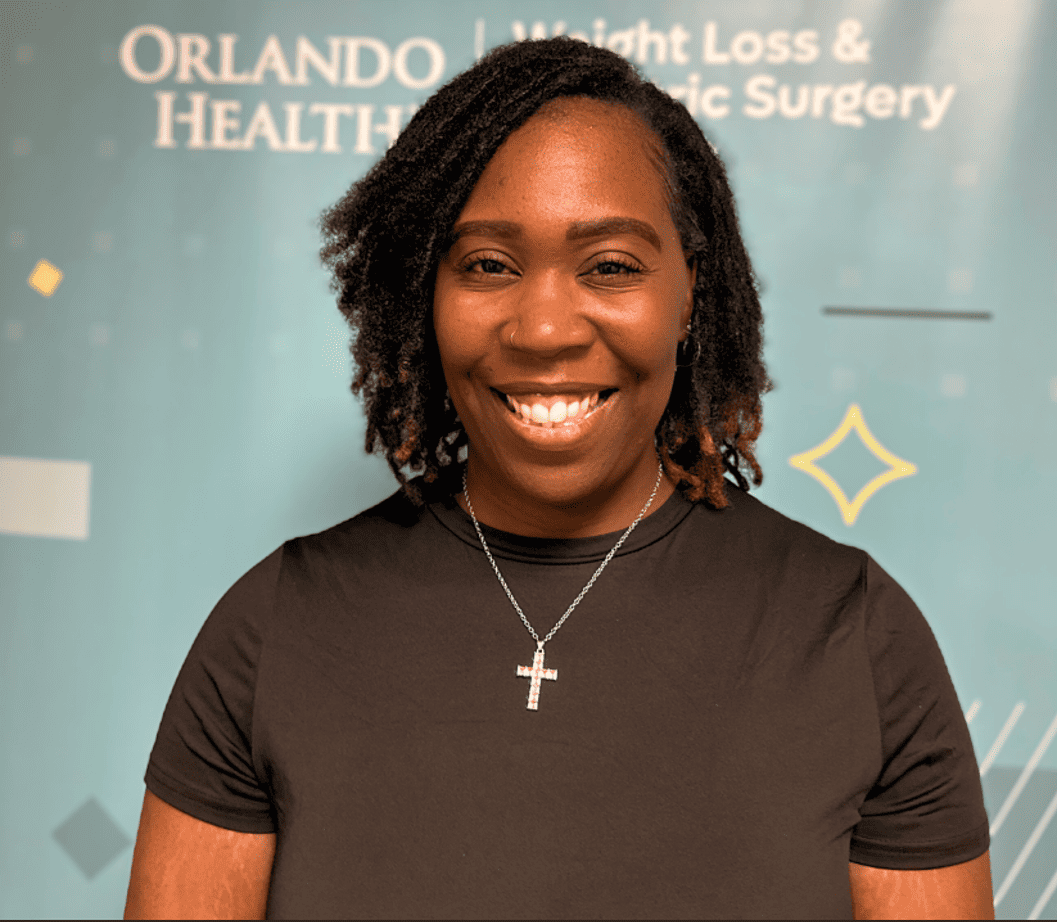80 Pounds Lighter, Young Mother Finds New Confidence
By Rona Gindin, Editorial Contributor
Visit Tatiana Cherry at home, and you’ll see her zip up and down the stairs to her fourth-floor apartment. She was barely able to manage those steps a year ago, when she was 80 pounds heavier. “I was so tired every time I went up,” she says. “Since I lost weight, I can’t think of a time I’ve been exhausted.”
Cherry, 35, has dropped from 270 pounds to 180 since undergoing weight-loss surgery at the Orlando Health Weight Loss and Bariatric Surgery Institute. She is bursting with energy now for her three children and her full-time job.
I used to be really skinny, even as a young adult, but the weight piled on when I began having children.- Tatiana Cherry
“I used to be really skinny, even as a young adult, but the weight piled on when I began having children,” she says. “It was really, really hard to lose that weight.” The tipping point came in March 2024 when she could barely squeeze into an amusement park ride with her child. “Right after that, I reached out to insurance about weight-loss surgery. Sure enough, they covered it,” she adds.
A month and a half later, she was wheeled into an operation room.
Selecting from the Weight-loss Surgery Menu
Patients like Cherry can choose from several types of weight-loss procedures, also known as bariatric surgeries. To figure out which was best for her, Cherry shared her goals with Dr. Andre Teixeira, a bariatric physician with the Orlando Health Weight Loss and Bariatric Surgery Institute.

“Tatiana told me she wanted a procedure that would help her lose a lot of weight and that will keep the weight off,” Dr. Teixeira recalls. They decided on the SADI duodenal switch. “It’s known for having a good record of giving patients the highest weight loss with the lowest long-term failure rate,” he explains.
Many bariatric patients need to factor medical challenges into their decisions, such as diabetes or high blood pressure, but not Cherry: She was healthy in every other way.
A Stomach That Is Literally Smaller
The duodenal switch made her stomach smaller. “I took about 80 percent of her stomach out, which means she has to eat less,” Dr. Teixeira says. “Then I rearranged her intestines in a way that decreases the amount of food her body will absorb.”
While Cherry was gearing up for surgery, she got a call saying she could have her procedure earlier due to a cancellation. Quickly she started on a high-protein liquid diet, a standard step meant to help patients lose some weight, reduce their liver size and ultimately make surgery less risky.
“I was starving, and I was not mentally prepared for that,” she says. “I was still at the stage where I was thinking about my why’s — why I needed to take this step.” Soon she had the procedure, then left the hospital to begin recovering.
Her sisters stepped up to mind the children — now ages 6, 11 and 16 — until Cherry was ready to cook, drive and parent again. Cherry hasn’t yet developed an exercise routine, although she wants to gain more muscle.
Low-Carb, Low-Calorie Twist on Family Meals
She eats differently, though. “I prioritize protein, at least 100 grams a day, and take sufficient supplements,” she says. The nutritional supplements make up for the fat-soluble vitamins A, D, K and E, along with other vitamins and minerals, that she no longer absorbs well from eating. She will need to do that for life.
She gets full after four or five bites of meat and a few sips of water. She steams or bakes chicken for herself while frying a batch for the children and eats meat sauce with cheese before tossing the rest of the batch into spaghetti for the family.
“I can only have candy, cake and chips in moderation,” she admits. “It’s bittersweet when I go to Chipotle and can only take two or three bites instead of stuffing my face.”
She hasn’t struggled, but she has support if she does.
“The most difficult part of bariatric surgery comes after the operation: lifestyle changes, psychological issues, nutrition evaluation and adjusting medications,” Dr. Teixeira says. “In addition to surgeons we have endoscopists, obesity medicine specialists, a nutritionist, a psychologist and even two plastic surgeons taking care of patients. It’s full spectrum.”
Once Cherry was up and about again, she weighed herself regularly. That’s a no-no. “I checked the scale often because I was hoping to lose the weight immediately,” she admits. She now understands that surgical weight loss is a “journey” that takes time.
Has her success been worth the sacrifices? She enthusiastically says yes. “I am so different in so many ways,” she says. “I like shopping for clothes now, and my clothes fit me so much better. I have so much more confidence now. I take pictures of myself now; I used to hate that.
“And I can go on theme park rides with my children.”




